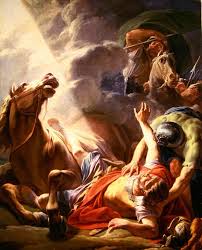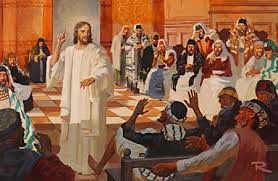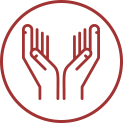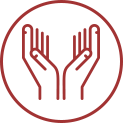Mass Readings
Catholic Ireland
Liturgical Readings for : Friday, 19th April, 2024Léachtaí Gaeilge
Next Sunday's Readings
Friday, Third Week of Easter
Paul is converted by the Risen Lord on the Road to Damascus.
The same Jesus is present in the Eucharist where he is our pledge of eternal communion with the Father.
FIRST READING
A reading from the Book Acts of the Apostles 9:1-20
This man is my chosen instrument to bring my name before pagans.
Saul was still breathing threats to slaughter the Lord’s disciples. He had gone to the high priest and asked for letters addressed to the synagogues in Damascus, that would authorise him to arrest and take to Jerusalem any followers of the Way, men or women, that he could find.
 Suddenly, while he was travelling to Damascus and just before he reached the city, there came a light from heaven all round him. He fell to the ground, and then he heard a voice saying, ‘
Suddenly, while he was travelling to Damascus and just before he reached the city, there came a light from heaven all round him. He fell to the ground, and then he heard a voice saying, ‘
Saul, Saul, why are you persecuting me?’
‘Who are you, Lord?‘ he asked, and the voice answered,
‘I am Jesus, and you are persecuting me.
Get up now and go into the city, and you will be told what you have to do.’
The men travelling with Saul stood there speechless,
for though they heard the voice they could see no one.
Saul got up from the ground, but even with his eyes wide open he could see nothing at all, and they had to lead him into Damascus by the hand. For three days he was without his sight, and took neither food nor drink.
A disciple called Ananias who lived in Damascus had a vision in which he heard the Lord say to him, ‘Ananias!‘
When he replied, ‘Here I am, Lord’,
the Lord said,
‘You must go to Straight Street and ask at the house of Judas for someone called Saul, who comes from Tarsus.
At this moment he is praying, having had a vision of a man called Ananias coming in and laying hands on him
to give him back his sight.’
When he heard that, Ananias said,
‘Lord, several people have told me about this man and all the harm he has been doing to your saints in Jerusalem.
He has only come here because he holds a warrant from the chief priests to arrest everybody who invokes your name.‘
The Lord replied,
‘You must go all the same, because this man is my chosen instrument to bring my name
before pagans and pagan kings and before the people of Israel;
I myself will show him how much he himself must suffer for my name.’
Then Ananias went. He entered the house, and at once laid his hands on Saul and said,
‘Brother Saul, I have been sent by the Lord Jesus who appeared to you on your way here
so that you may recover your sight and be filled with the Holy Spirit.’
Immediately it was as though scales fell away from Saul’s eyes and he could see again. So he was baptised there and then, and after taking some food he regained his strength. After he had spent only a few days with the disciples in Damascus, he began preaching in the synagogues, ‘Jesus is the Son of God.’
The Word of the Lord. Thanks be to God
Responsorial Psalm Ps 116
Response Go out to the whole world; proclaim the Good News.
Or Alleluia!
1. O praise the Lord, all you nations, acclaim him all you peoples! Response
2. Strong is his love for us; he is faithful forever. Response
Gospel Acclamation Lk 24:46.26
Alleluia, Alleluia!
It was ordained that the Christ should suffer and rise from the dead,
and so enter into his glory.
Alleluia!
or Jn 6: 56
Alleluia, Alleluia!
‘He who eats my flesh and drinks my blood lives in me and I live in him’, says the Lord.
Alleluia!
GOSPEL
The Lord be with you. And with your spirit
A reading from the holy Gospel according to John 6:52-59 Glory to you, O Lord
For my flesh is real food and my blood is real drink.
The Jews started arguing with one another:
‘How can this man give us his flesh to eat?’ they said.
Jesus replied:
 ‘I tell you most solemnly, if you do not eat the flesh of the Son of Man and drink his blood, you will not have life in you.
‘I tell you most solemnly, if you do not eat the flesh of the Son of Man and drink his blood, you will not have life in you.
Anyone who does eat my flesh and drink my blood has eternal life,
and I shall raise him up on the last day.
For my flesh is real food and my blood is real drink.
He who eats my flesh and drinks my blood lives in me and I live in him.
As I, who am sent by the living Father, myself draw life from the Father,
so whoever eats me will draw life from me.
He taught this doctrine at Capernaum, in the synagogue.
The Gospel of the Lord. Praise to you, Lord Jesus Christ
_________________________
Gospel Reflection Friday, Third Week of Easter John 6:52-59
The question that people ask in today’s gospel reading is a perfectly understandable one, ‘How can this man give us his flesh to eat?’ The notion of eating’s someone’s flesh is abhorrent. Yet, Jesus does not qualify what he says but, rather, he goes on to say something even more shocking. He not only calls on people to eat his flesh but to drink his blood. It is evident that Jesus is not speaking literally. His way of speaking reflects what he said at the last supper where, having taken, blessed and broken bread, he gave it to his disciples and said, ‘This is my body’. Then, having taken and blessed wine, he gave it to his disciples and said, ‘This is my blood’.
Jesus identified himself, body and blood, flesh and blood, with the elements of bread and wine. He went on to instruct his disciples at the Last Supper to ‘do this in memory of me’. Ever since, the church has repeated the actions and words of Jesus at the last supper. In today’s first reading we have the dramatic story of the call of Paul. Paul will later declare in his first letter to the Corinthians, ‘The cup of blessing that we bless, is it not a communion in the blood of Christ?
The bread that we break, is it not a communion in the body of Christ?’
This was the faith of the early church and of the church ever since. The Lord wishes to enter into communion with us in a very profound way at the Eucharist so that, in the words of the gospel reading, we can draw life from him. The Eucharist is a celebration of life. We are then sent out from the Eucharist to nurture and protect life in all its forms.
__________________________________
The Scripture Readings are taken from The Jerusalem Bible, published 1966 by Darton, Longman & Todd Ltd. and used with the permission of the publishers. http://dltbooks.com/
The Scripture Reflection is made available with our thanks from his book Reflections on the Weekday Readings 2024: The Word is near to you, on your lips and in your heart by Martin Hogan and published by Messenger Publications 2022/23, c/f www.messenger.ie/bookshop/
___________________________________





















